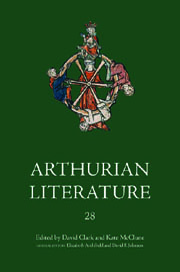Book contents
- Frontmatter
- Contents
- General Editors' Foreward
- Preface
- List of Contributors
- Abbreviations
- I Reading Malory's Bloody Bedrooms
- II (Dis)Figuring Transgressive Desire: Blood, Sex, and Stained Sheets in Malory's Morte Darthur
- III Bewmaynes: the threat from the kitchen
- IV Sibling Relations in Malory's Morte Darthur
- V ‘Traytoures’ and ‘Treson’: the Language of Treason in the Works of Sir Thomas Malory
- VI ‘The Vengeaunce of My Brethirne’: Blood Ties in Malory's Morte Darthur
- VII Malory and the Scots
- VIII Blood, Faith and Saracens in ‘The Book of Sir Tristram’
- IX Barriers Unbroken: Sir Palomydes the Saracen in ‘The Book of Sir Tristram’
- X Virginity, Sexuality, Repression and Return in the ‘Tale of the Sankgreal’
- XI Launcelot in Compromising Positions: Fabliau in Malory's ‘Tale of Sir Launcelot du Lake’
- Title in the Series
General Editors' Foreward
Published online by Cambridge University Press: 05 February 2013
- Frontmatter
- Contents
- General Editors' Foreward
- Preface
- List of Contributors
- Abbreviations
- I Reading Malory's Bloody Bedrooms
- II (Dis)Figuring Transgressive Desire: Blood, Sex, and Stained Sheets in Malory's Morte Darthur
- III Bewmaynes: the threat from the kitchen
- IV Sibling Relations in Malory's Morte Darthur
- V ‘Traytoures’ and ‘Treson’: the Language of Treason in the Works of Sir Thomas Malory
- VI ‘The Vengeaunce of My Brethirne’: Blood Ties in Malory's Morte Darthur
- VII Malory and the Scots
- VIII Blood, Faith and Saracens in ‘The Book of Sir Tristram’
- IX Barriers Unbroken: Sir Palomydes the Saracen in ‘The Book of Sir Tristram’
- X Virginity, Sexuality, Repression and Return in the ‘Tale of the Sankgreal’
- XI Launcelot in Compromising Positions: Fabliau in Malory's ‘Tale of Sir Launcelot du Lake’
- Title in the Series
Summary
Volume 28 of Arthurian Literature is dedicated to one of the last Arthurian writers of the Middle Ages, Sir Thomas Malory, whose Arthuriad stands at a crucial crossroads in the evolution of the legend. Although he seems to have written much, if not all, of the Morte Darthur while in prison, he drew on a wide range of French and English sources, sometimes copying word for word, sometimes omitting significant passages, sometimes adding details, dialogue, or whole episodes and tales apparently of his own devising. Many of the essays collected here are concerned with the ways in which he adapted these sources (and motifs such as ‘the bloody sheets’) to suit his own concerns and approaches. This is of interest not just in relation to his use of sources and to his own literary and historical context, but also because his version of the legend has had such a powerful influence on post-medieval Anglophone responses to the Arthurian world in poems, novels, films and the visual arts.
The papers collected here address perennially fascinating topics: blood (inherited and spilled), sexual and familial relationships, loyalty and treason, comedy and tragedy, literature and history. These essays confirm Caxton's claim in his preface to the first printed edition of the Morte Darthur: ‘For herein may be seen noble chivalrye, curtosye, humanyté, frendlynesse, hardynesse, love, frendshyp, cowardyse, murdre, hate, vertue, and synne’. This is also true of other versions of the legend, of course, but Malory's account is one of the most lastingly influential. Most of the contributors to this volume are at the beginning of their scholarly careers.
- Type
- Chapter
- Information
- Arthurian Literature XXVIIIBlood, Sex, Malory: Essays on the 'Morte Darthur', pp. vii - viiiPublisher: Boydell & BrewerPrint publication year: 2011



